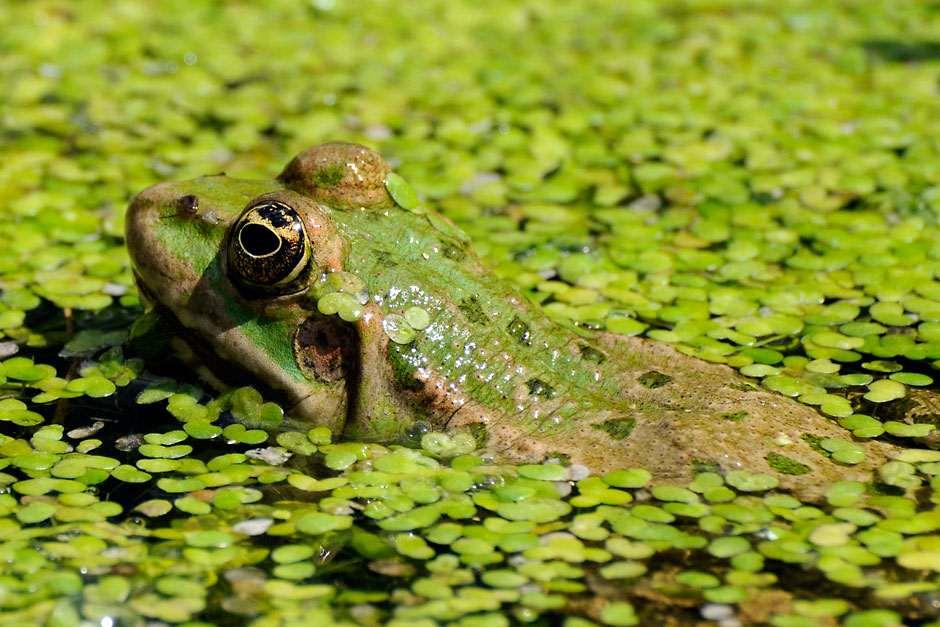Amphibians in your garden
Frogs, toads and newts can all be found in gardens where they predate on a wide range of invertebrates. It's easy to encourage them by providing a pond where tadpoles can develop and with at least one shallowly sloping side up to dry land to allow easy access. Make your garden great for adult amphibians by creating log piles and other damp habitats in which they can shelter.

Quick facts
Timing Ponds are best built from early spring to autumn
Difficulty Easy
Which amphibians are found in gardens?
Britain has two
- Of these, the common frog and common toad are likely to be found in gardens throughout Britain
- The common or smooth newt and the palmate newt are also widely distributed
- Some garden ponds may have the scarce and protected great crested newt, while some gardens, especially in south east England, may have non-native green marsh frogs
- The natterjack toad and the pool frog are unlikely to occur in gardens
These animals feed on a wide range of small invertebrates.
- Although the adults and juveniles do most of their feeding on land, all of these amphibians must have still water, such as a pond, in which they will mate and lay eggs
- The eggs hatch into tadpoles that initially feed on algae. Later they feed on insects that have fallen in the water and are predatory on other pond life. The tadpoles gradually develop legs and, in the case of frogs and toads, lose their tails, and become small frogs, toads or newts
How to attract amphibians to the garden
Amphibians and ponds
These creatures can be helped by providing a pond where the tadpoles can develop:
- At least one side of the pool should gradually slope up to dry land, this enables the young amphibians to leave the water once the tadpole stage is over
- If the pond has steep sides a ramp covered in chicken wire in one corner can help
- Small amphibians can be predated by birds and other predators, growing plants around the pool will provide some cover
- When in the pond, frogs and toads need a point above the water on which to rest and breathe. In the summer a water lily pad may suffice but a more permanent solution is to position a few rocks or logs half in and half out of the water if there are no suitable areas of shallow water
- Allow new ponds to become colonised naturally by amphibians that are likely to be already present in the area, rather than transferring spawn or tadpoles. This reduces the risk of spreading infection and diseases which can kill amphibians
- Newts are probably the most aquatic of British amphibians. Attract them by allowing grass to grow over the pond edge into the water and introducing non-invasive submerged aquatic plants. Newts use narrow-leaved water plants on which to lay their eggs, placing each egg between a folded leaf
- Fish will eat spawn, tadpoles and other pond life so should not be introduced into a pond for amphibians
- Frogs and newts will also overwinter in the bottom of ponds
Where else to find amphibians
Adult amphibians often spend time out of water, especially over winter. In the autumn, many amphibians seek sheltered places away from ponds where they shelter until the following spring.
- Log piles provide good shelters. Frogs, toads and newts will also find suitable places in hedge bottoms, compost heaps and under stones or paving slabs
- Careful if moving pots or wheelie bins, especially in hot weather, as amphibians can be hiding out under them where it is nice and damp
- Greenhouses often have a resident frog or toad due to it staying damp and being a good place for them to hunt
Problems
Transferring spawn or tadpoles from other ponds runs the risk of spreading amphibian diseases, such as ranavirus, or introducing invasive pond weeds that can quickly choke the pond with vegetation.
To avoid disturbing amphibians, especially in the hibernation period, only clean out your pond when it is really necessary.
Have you seen any sick or dead amphibians or other wildlife in your garden? Register and report it on the Garden Wildlife Health website.
Get involved
The Royal Horticultural Society is the UK’s leading gardening charity. We aim to enrich everyone’s life through plants, and make the UK a greener and more beautiful place.